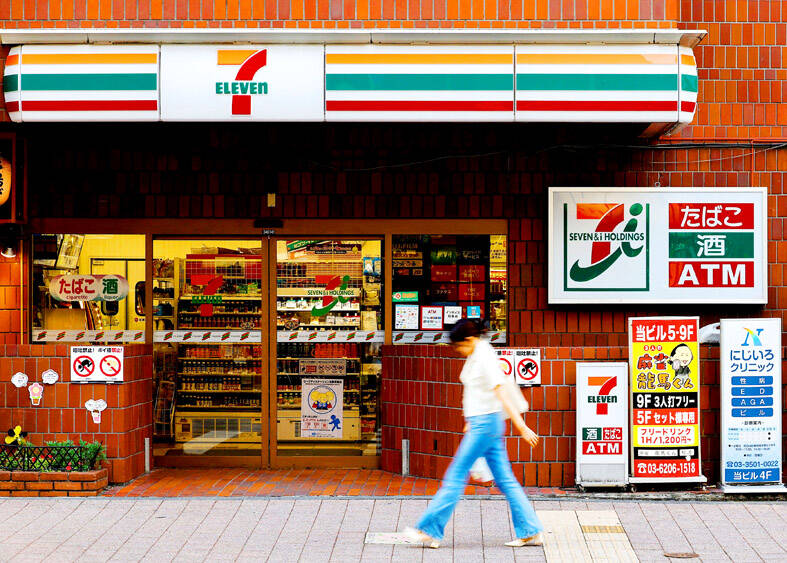The Japanese owner of 7-Eleven said Wednesday its founding family had offered a counter-bid to a takeover attempt by Canadian convenience store rival Alimentation Couche-Tard Inc (ACT).
With about 85,000 outlets, 7-Eleven is the world’s biggest convenience chain. If realized, ACT’s 7 trillion yen (US$45 billion) takeover would be the largest foreign buyout of a Japanese firm.
Bloomberg News said up to 9 trillion yen could be spent on taking the retail group private instead.

Photo: Reuters
Seven & i Holdings Co said on Wednesday it had received a non-legally binding acquisition proposal from its vice president Junro Ito, the founder’s son, and his company Ito-Kogyo Co.
A special committee “has been reviewing the proposal carefully and thoroughly with its financial and legal advisors,” its statement said.
“No determination has been made at this time to pursue a transaction with either Mr Ito and Ito-Kogyo, ACT, or any other party, and there can be no assurance that any such transaction will be entered into or consummated,” it said.
Ito-Kogyo holds a stake of around 8 percent in the Japanese retail giant.
“Mr Ito has been excluded from all discussions within the company ... relating to any proposal,” the statement said.
Seven & i stocks closed more than 11 percent higher, having soared as much as 17 percent following the news.
The 7-Eleven franchise began in the US, but it has been wholly owned by Seven & i since 2005.
Around a quarter of 7-Eleven stores are in Japan, where the stores are a cherished one-stop shop for everything from rice balls to concert tickets.
ACT, which began with one store in Canada’s city of Laval in 1980, now runs nearly 17,000 convenience outlets worldwide.
The Nikkei, citing sources close to Seven & i, said the company had begun talks with financial institutions to procure the necessary resources to go private.
However, it said potential obstacles could include whether the banks would agree to the huge loans required.
Seven & i is Japan’s biggest retailer, with a current market cap of 6.5 trillion yen.
In September, it rejected an initial takeover offer from ACT, saying the proposal “grossly” undervalued its business and could face regulatory hurdles.
The group said last month it had received a revised offer that reportedly totaled around 7 trillion yen.
To boost its share price and fend off ACT, Seven & i has also announced a major restructuring, including plans to spin off its non-core businesses.
To allow it to focus on 7-Eleven, its new holding company would comprise its supermarket food business, specialty stores and other businesses.

Application-specific integrated circuit designer Faraday Technology Corp (智原) yesterday said that although revenue this quarter would decline 30 percent from last quarter, it retained its full-year forecast of revenue growth of 100 percent. The company attributed the quarterly drop to a slowdown in customers’ production of chips using Faraday’s advanced packaging technology. The company is still confident about its revenue growth this year, given its strong “design-win” — or the projects it won to help customers design their chips, Faraday president Steve Wang (王國雍) told an online earnings conference. “The design-win this year is better than we expected. We believe we will win

Intel Corp chief executive officer Lip-Bu Tan (陳立武) is expected to meet with Taiwanese suppliers next month in conjunction with the opening of the Computex Taipei trade show, supply chain sources said on Monday. The visit, the first for Tan to Taiwan since assuming his new post last month, would be aimed at enhancing Intel’s ties with suppliers in Taiwan as he attempts to help turn around the struggling US chipmaker, the sources said. Tan is to hold a banquet to celebrate Intel’s 40-year presence in Taiwan before Computex opens on May 20 and invite dozens of Taiwanese suppliers to exchange views

Chizuko Kimura has become the first female sushi chef in the world to win a Michelin star, fulfilling a promise she made to her dying husband to continue his legacy. The 54-year-old Japanese chef regained the Michelin star her late husband, Shunei Kimura, won three years ago for their Sushi Shunei restaurant in Paris. For Shunei Kimura, the star was a dream come true. However, the joy was short-lived. He died from cancer just three months later in June 2022. He was 65. The following year, the restaurant in the heart of Montmartre lost its star rating. Chizuko Kimura insisted that the new star is still down

While China’s leaders use their economic and political might to fight US President Donald Trump’s trade war “to the end,” its army of social media soldiers are embarking on a more humorous campaign online. Trump’s tariff blitz has seen Washington and Beijing impose eye-watering duties on imports from the other, fanning a standoff between the economic superpowers that has sparked global recession fears and sent markets into a tailspin. Trump says his policy is a response to years of being “ripped off” by other countries and aims to bring manufacturing to the US, forcing companies to employ US workers. However, China’s online warriors